Any website you visit today or Mobile app you use will most likely have a couple legal pages on them, such as the Disclaimer, Privacy Policy, Terms and Conditions, Refund Policy etc. How do you create them is what this WebsitePolicies review will help you out with.
Do the pages include everything a page like them should include? Can you make these pages yourselves without using third-party help? These are just some of the questions we aim to answer throughout this piece.
Table of Contents
- WebsitePolicies Review: What is WebsitePolicies.com?
- WebsitePolicies Overview
- Why do you Need Website Policies?
- What can WebsitePolicies.com Generate?
- How to Use WebsitePolicies?
- Automatic Embedding and Display
- Customization Abilities and Consent Banner
- Pricing Plans: Largely free, Optional Premium Package.
- Support
- Final Word on WebsitePolicies Review
WebsitePolicies Review: What is WebsitePolicies.com?
Obviously WebsitePolicies.com isn’t the kind of site you see everyday, hence the first question that pops up is what exactly is WebsitePolicies?
In my personal opinion and words, it’s an A.I Internet Lawyer, an expert one at that. It lets users create legal documents for their Websites, Mobile apps and other similar platforms.
For the users, it’s simply a form-filling process. It reduces the cost to a fraction of what it would be if done by offline lawyers.
Even though it’s completely automated, and delivers the policies/ banners instantly, the core-policies were actually drafted by actual lawyers. These policies are then customized according to user needs, brand, region and other such requirements.
WebsitePolicies Overview
Here’s a brief glimpse of the company before diving deeper into this WebsitePolicies review:
- URL: https://www.websitepolicies.com
- Registration: Not required (auto account-creation).
- Pricing Plans: Free (optional Paid plans).
- Support: E-mail /Live chat.
- Delivery time: Instant.
Why do you Need Website Policies?
The next logical question is, do you really need those documents? And if so, do you really need WebsitePolicies (or other similar tools) to create them and not do them yourselves?
The answer to the question is three-fold which encompasses the Legal-factor, the “Accuracy factor” and the Trust- factor.
The Legal factor is the first and most important reason why you’d need those pages on your website.
It’s required by various laws across the globe, such as the GDPR which was enforced on 25th May, 2018 to ensure you have a Cookie Policy page/banner on your site if you collect personal information from your audience.
Failing to do so has serious consequences.
In Canada it’s the PIPED (Personal Information Protection and Electronic Documents) Act you have to adhere to if you own a Website or App.
Australia has the Privacy Act of 1988, while UK has the DPA (Data Protection Act). Similarly most other nations have other such Acts which require you by law to have those pages on your website.
As for the USA, there are various laws which need to be bundled together and taken into account while getting the legal pages done. Some of which are the COPPA, the CalOPPA, CSA (Computer Security Act) 1997 and many others.
And it’s not just “Countries”, quite a few third-party apps/websites too require you to have those legal pages ready before you can use these third-party products on your website/app.
The most common third-party resource attached to Websites are Google Adsense and Google Analytics, aren’t they?
Well both of those require you to have a specific set of clauses on your site to inform users of the required information.
Bottomline, if you do not have the required legal pages, users can file serious legal charges against you on Privacy violation, Fraud, misinformation and many other grounds.
Also, the third-party apps may deny payment, or even file a case in some cases if you haven’t complied to their requirement of the legal pages, or specific clauses.
So they’re legally very important, that’s established.
The final reason why you need external help from companies like WebsitePolicies is- Accuracy.
For starters, I doubt any of us (me included) are well-versed in the legal requirements of such pages. We wouldn’t know what information to ask for, declare, or what clauses to include.
Missing any one of these has the same consequences as missing the entire page altogether.
If you write these pages yourselves, there’s every chance that some of those will be missed and that’s why such third-party educated-help may come in handy.
Secondly, knowing “English” and knowing the “legal” language are two very different things. For e.g. in common, everyday language a word means many different things but in the court of law it’s interpreted differently.
Hence, these legal pages have to be accurate, use the legally correct, most descriptive and non-vague words which we may not be aware of.
This again is where expert help such as WebsitePolicies.com may be employed to avoid the least chances of the wrong information being conveyed, clauses being missed and so on.
What can WebsitePolicies.com Generate?
There isn’t just one type of legal page your website/app needs, rather many. How many, or which of these can WebsitePolicies.com generate is what we’ll address in this section of this WebsitePolicies review.
So the platform can generate:
- Privacy Policies
- Terms and Conditions
- Disclaimer
- Refund Policy
- Cookie Policy
- & Cookie Consent Banner.
Privacy Policies
The Privacy Policy is what most govts. pay most attention to and have direct laws governing the same.
These are the pages which disclose your nature of collecting, using, storing as well as safe-keeping the personal information of users.
The govt. regulations differ for each country and region, so what information can or can’t be collected too differ for each country.
Some countries make it mandatory for you to have an “opt out” button, with some others it may be optional.
Just like it’s not mandatory under CalOPPA to respond to a “Do not track” request, however if your company/site/app does or doesn’t respond to those requests has to be mentioned in the Privacy Policy.
The Australian Privacy Act of 1988 has 13 core Principals governing its Privacy policies, while the UK DPA has 8.
Some laws even dictate the placement, visibility and other such factors regarding the Privacy Policies.
What I’m trying to establish here is, these policies aren’t just articles that you can churn up yourself and put up for display, they do have to be done the right way.
Terms and Conditions
These are less govt-controlled and more like an agreement of terms before a user can use your website/app.
It may consist of anything you want your visitor to know about the nature of your products, delivery, quality or anything else.
It also consists of what you expect from the visitor/user/customer in certain scenarios.
Having a T&C primarily helps you avoid unwanted pleasantries and keep things transparent between you and the visitor.
Disclaimer
There’s a ton of information and/or products on any given website. The Disclaimer helps you limit your legal liability in case something goes wrong or is misinterpreted.
It’s also a legal requirement to be used when selling most third-party products to customers, announcing your gains if the sale happens.
Refund Policy
Ah, you already know what this is even if you don’t own a website or product, don’t you?
It states the circumstances under which a company will refund a purchase. The amount of refund, time required for the refund and everything else is included in the Refund policy.
Cookie Policy and Consent Banner
After the GDPR being passed in May last year, this is something that requires serious attention from Website and App owners on the internet.
Cookie Policy is what outlines your nature of storing, using, and sharing user cookies. The way the cookies are stored and everything else related to the Cookies.
The consent banner is the newest addition. It’s a banner displayed on sites which has to outline your cookie policy actively without needing users to manually find or stumble upon it.
Here’s an example from WebsitePolicies of what a Cookie Consent Banner is. This too can be created in seconds using WebsitePolicies.
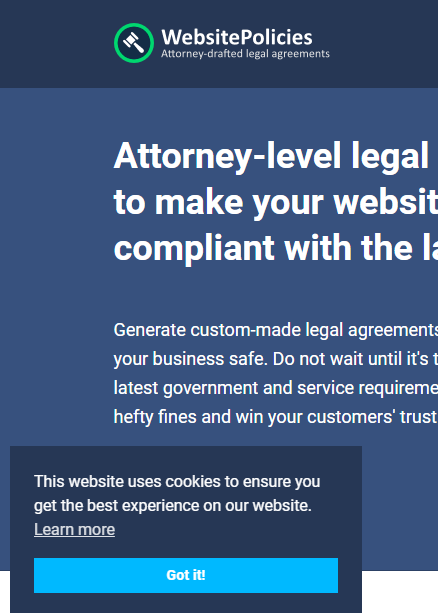
In a nutshell, any legally binding page/document that you as a website owner should have, can be created using WebsitePolicies.
How to Use WebsitePolicies?
Finally down to the most important section of this WebsitePolicies review. How can you create those pages for your website?
As mentioned in the earlier sections of this WebsitePolicies review, the process involves just filling couple forms out.
For starters, simply go to the homepage and click on “Getting Started”. After which, you’ll be asked to choose the exact document you need drafted.
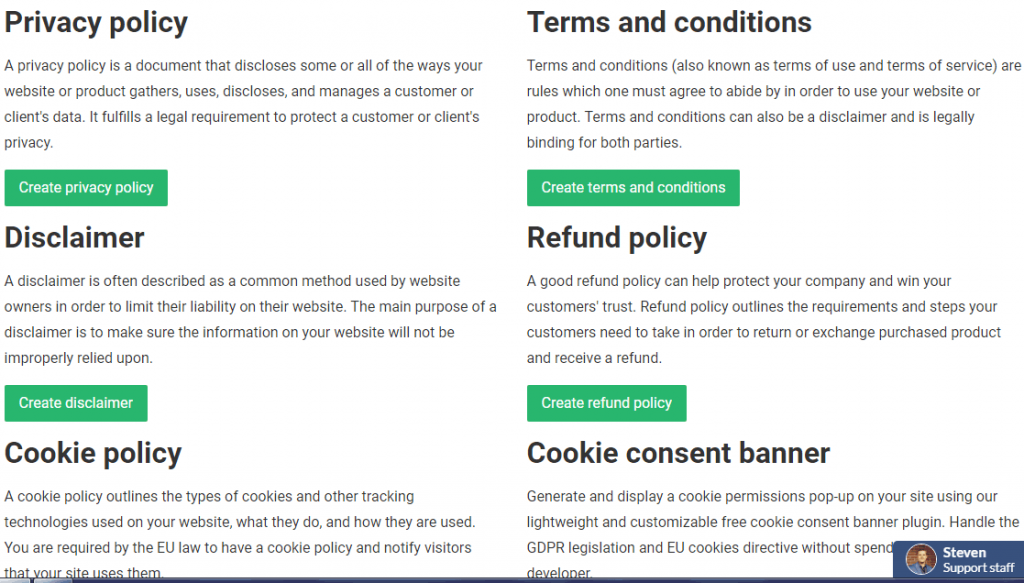
For this example, I’m going with “Privacy Policies”. This is the kind of form that’s displayed:
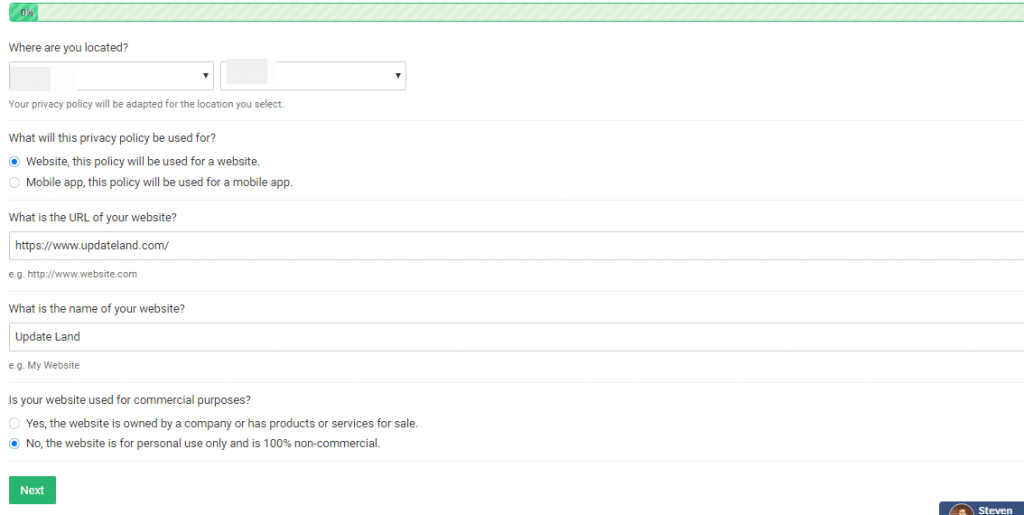
Note that there’s a slider on top which displays your progress, hence the User-interface wins 5-stars from me.
The form by itself is extremely easy to be understood and filled. Simply enter your location, company/website name and other details.
The form as is evident can be customized entirely to match your “brand” and the policy won’t be a generic one.
On the next page, specify if there’s a registered company for the website/app or it’s run by an individual.
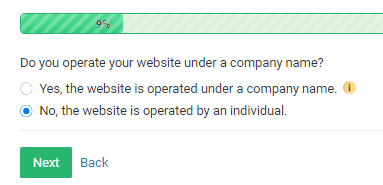
Then, choose if your website/app has a signup option for users.
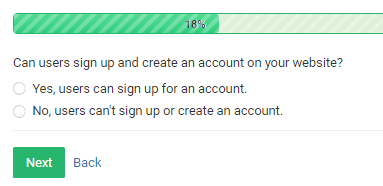
Simply keep clicking the right buttons and proceeding to the next pages (no use going through all the questions here, is it?).
Finally when you reach 100% completion, this is what you should see:
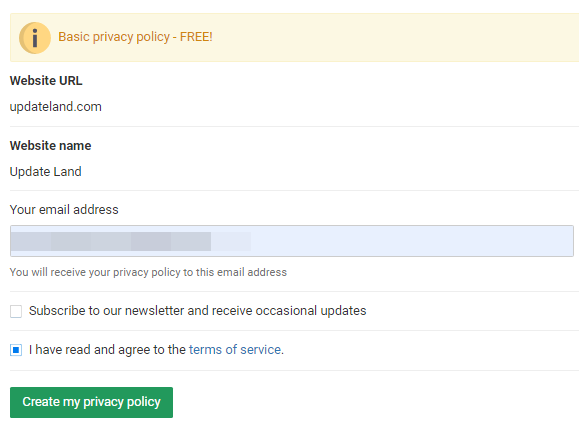
Simply enter your E-mail address. You’ll be asked to go to your E-mail and click on a verification link.
Clicking on the link automatically takes users back to WebsitePolicies and you can click on your Policy name to view it right away.

Automatic Embedding and Display
This is a factor that impressed me with the company and hence is being mentioned in this WebsitePolicies review.
Once a Policy is done, you don’t have to “get creative” trying to embed or display it on your site.
Rather, the company offers a number of options:
- Free hosting on WebsitePolicies: Meaning, simply use the provided link and the policy will forever be hosted on WebsitePolicies, as well as be updated automatically with recent regulations. This helps save not just time, but also server resources on your website.
- HTML Code: Embed it on your site to display the policy.
- Plain text.
Customization Abilities and Consent Banner
Most other forms can be created in the same way as the Privacy Policy, simply click on choices and you’re done.
However the consent banner is different, it offers more designing abilities, colour choices, layouts and other choices. Hence this separate section so we could do justice to the service being provided.
Here’s what the configuration wizard looks like:
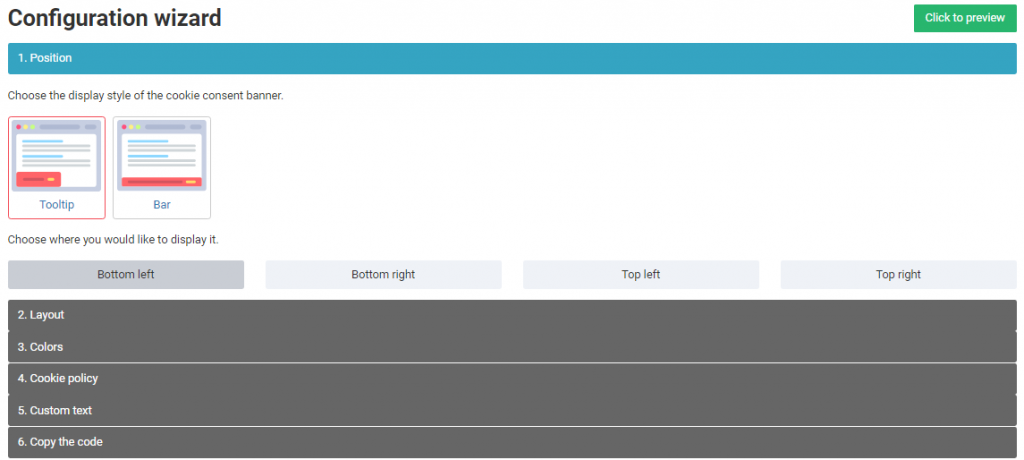
As is evident, users get to choose:
- Position
- Layout
- Colours (tons of predesigned combinations).
- Custom text etc.
You can even preview it in real-time and make changes. It takes seconds, or minutes at best, offers a lot of customization abilities and is free.
Pricing Plans: Largely free, Optional Premium Package.
One of the final sections to this WebsitePolicies review is its pricing plan. Is it free? Well it largely is.
What I mean is, you can create almost all the pages and documents without having to pay a penny.
They also can be used both for Commercial, as well as Personal uses without restrictions.
However they do have optional paid plans which cost USD $14.95 one-time.
Free plans have some restrictions, for starters you can’t include some specific commercial clauses during policy creation, primarily the ones related with “payments”.

The “info” icon shows up on clauses which can’t be included in the free plan.
Then, these free policies also must have a link with credits to WebsitePolicies.com. And finally, the paid policies have more clauses and statements than free ones.
Support
I didn’t expect for a legal company as such to actually provide live-support, which it did!
They obviously have E-mail and contact us pages, but for some hours throughout the day (not 24X7) they also have a live-chat available. The representative I talked to (Steven) was not only informative but also “fast” (which is a rarity).
Final Word on WebsitePolicies Review
So that’s a wrap as far as this WebsitePolicies.com review goes. If you ask for my verdict, I’d say it’s straight-forward, fast and easy to understand.
Checks all the right boxes, offers various documents to be created, has all the clauses which should be there in one such policy and also allows for custom clauses.
Bottomline, I’m pretty impressed. Although do drop your two cents in the comments both about this WebsitePolicies review as well as the platform in general.
